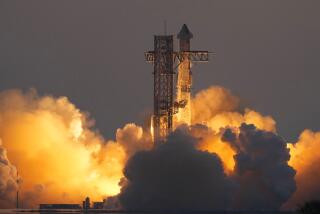SpaceX capsule arrives at space station on key resupply mission
- Share via
After performing a series of delicate maneuvers above the Earth, SpaceX’s cone-shaped Dragon capsule moved in Wednesday for a historic docking with the International Space Station.
Hawthorne-based Space Exploration Technologies Corp., better known as SpaceX, is on track to become the first private company to resupply the space station on a contracted mission for NASA.
At about 3:56 a.m. PDT, the crew aboard the space station used its robotic arm to grab the Dragon as it floated outside. It was a key moment in NASA’s plan to outsource such missions to private companies now that its fleet of space shuttles is retired.
“Looks like we’ve tamed the Dragon,” said NASA astronaut Sunita Williams aboard the station. “We’re happy she’s on board with us.”
Using the robotic arm, the station crew is to bring the Dragon spacecraft in for docking within the next few hours.
The Dragon has spent the last two days circling the Earth.
On Sunday night, SpaceX’s Falcon 9 rocket launched the capsule from Cape Canaveral, Fla. Dragon was able to reach the space station despite a malfunction that claimed one of the Falcon 9’s nine main rocket engines.
After the Dragon has docked with the space station, the crew is to unload the 882 pounds of food, experiments and other supplies on the capsule and reload it over the next 2 1/2 weeks with cargo to bring back to Earth.
When the Dragon is sent back, the craft is to deploy parachutes to slow its descent after entering Earth’s atmosphere and should splash down in the Pacific Ocean hundreds of miles west of Southern California.
ALSO:
Charting space shuttle history on the Southland map
Winds blamed as attempt to break free-fall record is aborted
Successful SpaceX launch starts mission to resupply space station
More to Read
Inside the business of entertainment
The Wide Shot brings you news, analysis and insights on everything from streaming wars to production — and what it all means for the future.
You may occasionally receive promotional content from the Los Angeles Times.











